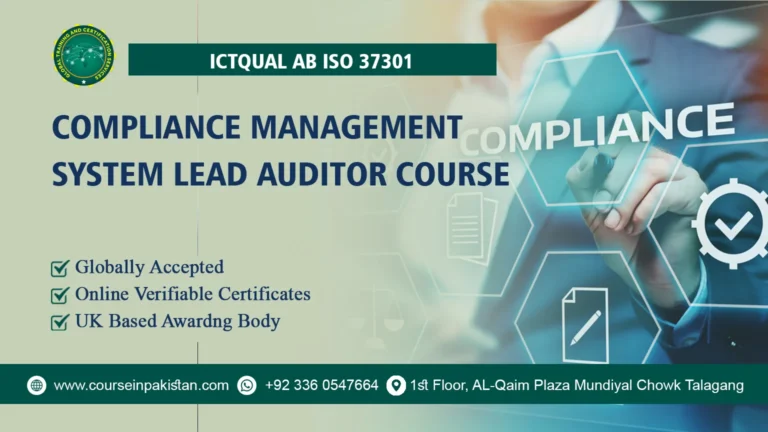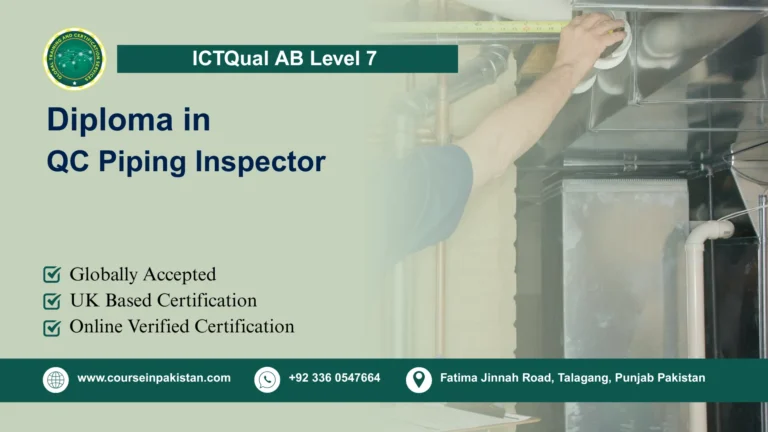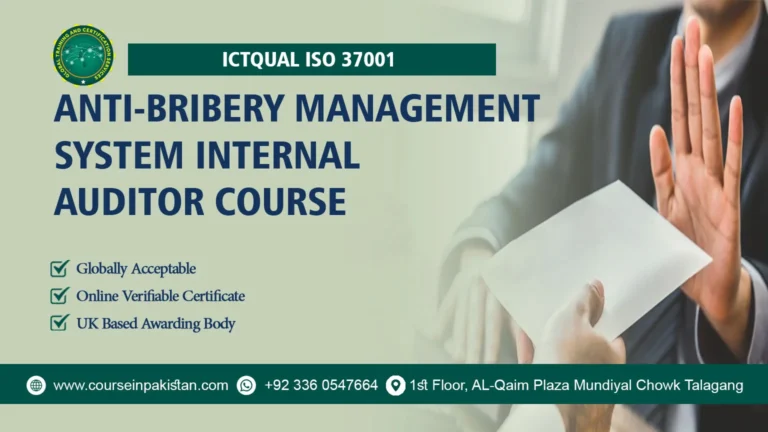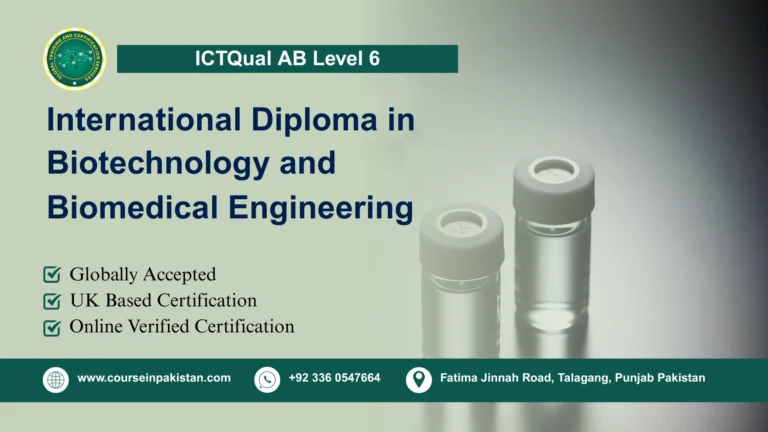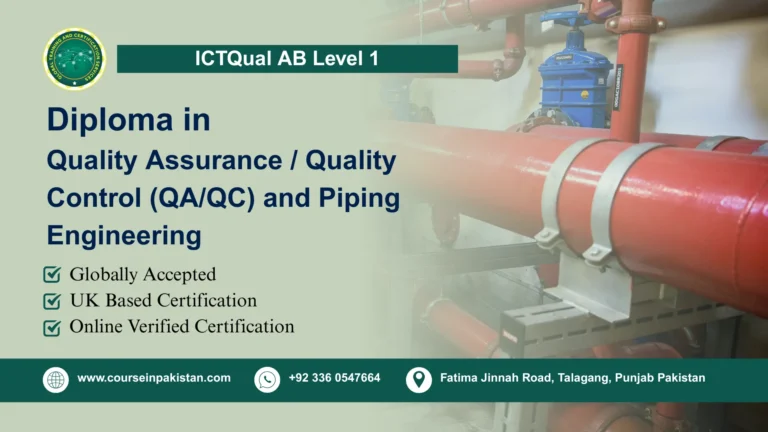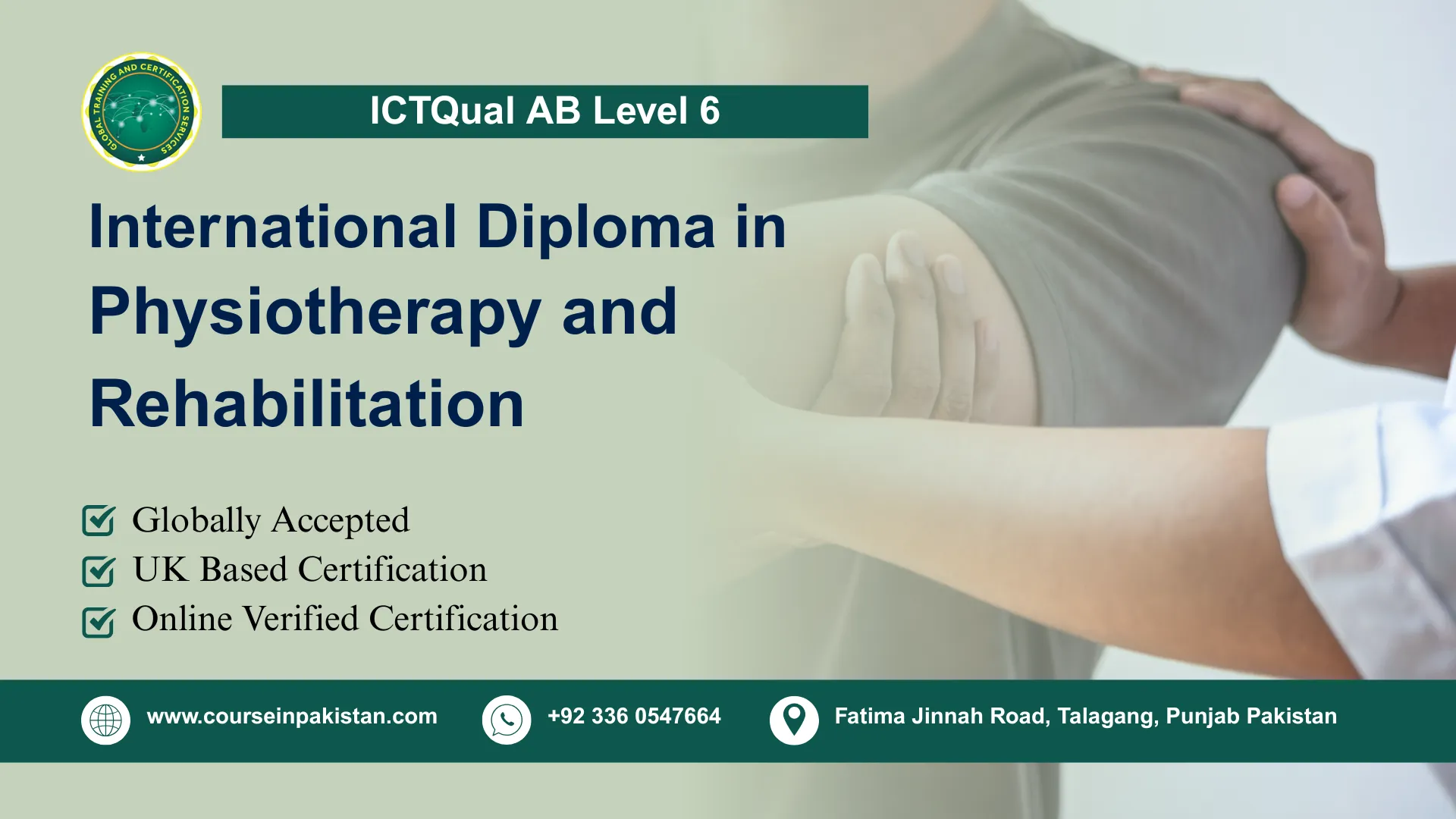
The ICTQual AB Level 6 International Diploma in Physiotherapy and Rehabilitation is a globally recognized qualification designed for individuals aiming to excel in physiotherapy, rehabilitation, and allied health practices. This program equips learners with advanced knowledge and practical skills necessary to assess, treat, and rehabilitate patients with diverse physical conditions. It is ideal for professionals seeking career advancement, as well as fresh candidates eager to establish themselves in the healthcare industry.
This diploma combines theoretical knowledge with practical application, enabling learners to confidently handle real-world rehabilitation challenges, from musculoskeletal disorders to post-surgical recovery. With a flexible, assignment-based structure, this certification allows learners to study at their own pace from anywhere in the world.
Course Overview
The ICTQual AB Level 6 International Diploma in Physiotherapy and Rehabilitation is a globally recognized, 360-credit qualification designed for individuals seeking advanced expertise in physiotherapy, patient assessment, and rehabilitation. This fully assignment-based program allows learners to study at their own pace from anywhere in the world, combining theoretical knowledge with practical application to handle diverse physical conditions and rehabilitation challenges confidently. The certification is British Council verifiable, MOFA attested, and Embassy attestable, making it ideal for international career opportunities and Iqama approval.
This qualification caters to both fresh candidates and experienced professionals. Fresh learners must complete all 36 mandatory assignments within 3 years, while experienced and competent professionals with at least 6 years of relevant experience can achieve the diploma in a shorter period by submitting verifiable evidence and defending their knowledge in professional discussion meetings with an ICTQual AB approved assessor, without completing all assignments. This diploma equips learners with globally recognized skills, enhancing career prospects in healthcare, rehabilitation centers, and physiotherapy practices.
Key Highlights of the Course:
- Fully 360-credit Level 6 diploma, assignment-based, with global flexibility.
- British Council verifiable, MOFA and Embassy attestable, ideal for professional recognition and Iqama approval.
- Suitable for both fresh graduates and experienced professionals.
- Experienced candidates can fast-track completion through professional discussions without finishing all assignments.
- Comprehensive coverage of physiotherapy, rehabilitation, patient assessment, and treatment planning.
Course Benefits
Career Advancement
- Open doors to managerial and specialist roles in hospitals, clinics, and rehabilitation centers.
- Gain recognition as a certified physiotherapy professional worldwide.
Flexible Learning
- Fully assignment-based, allowing you to study at your own pace and from anywhere.
- Ideal for professionals balancing work and study commitments.
Global Recognition
- British Council verifiable, MOFA and Embassy attestable, supporting international job and Iqama approvals.
- Enhance credibility and career opportunities in the global healthcare sector.
Experience-Based Fast-Track
- Experienced professionals can leverage their 6+ years of relevant experience to fast-track the diploma.
- Professional discussion meetings with ICTQual AB approved assessors replace some mandatory assignments.
Practical Skill Development
- Advanced knowledge in physiotherapy assessment, rehabilitation techniques, and patient care.
- Prepares learners for real-world challenges in healthcare and rehabilitation.
Course Study Units
This qualification, the ICTQual AB Level 6 International Diploma in Physiotherapy & Rehabilitation 360 Credits – Three Years, consists of 36 mandatory units.
Year 1: Foundation in Physiotherapy & Rehabilitation
- Introduction to Human Anatomy and Physiology
- Principles of Rehabilitation Science
- Foundations of Musculoskeletal Physiotherapy
- Introduction to Neurological Rehabilitation
- Therapeutic Exercise and Movement Science
- Basic Patient Assessment Techniques
- Principles of Pain Management
- Introduction to Manual Therapy
- Healthcare Ethics and Professional Practice
- Medical Terminology and Communication Skills
- Introduction to Research Methods in Healthcare
- Health and Safety in Clinical Environments
Year 2: Intermediate Physiotherapy & Rehabilitation
- Advanced Musculoskeletal Rehabilitation
- Neurological Physiotherapy Techniques
- Exercise Prescription and Functional Training
- Clinical Assessment and Diagnostic Methods
- Therapeutic Modalities and Equipment
- Patient-Centred Care and Communication
- Rehabilitation in Sports and Orthopaedics
- Evidence-Based Practice in Physiotherapy
- Pain Science and Management Strategies
- Clinical Decision-Making in Rehabilitation
- Rehabilitation for Special Populations
- Professional Development and CPD Planning
Year 3: Advanced Physiotherapy & Rehabilitation
- Advanced Neurological Rehabilitation Techniques
- Complex Musculoskeletal Management
- Integrated Rehabilitation Programmes
- Leadership and Management in Physiotherapy
- Clinical Research and Evidence Application
- Advanced Manual Therapy and Techniques
- Rehabilitation in Critical Care and Chronic Conditions
- Advanced Patient Assessment and Diagnostics
- Innovation and Technology in Physiotherapy
- Professional Ethics and Legal Considerations
- Independent Project or Capstone in Rehabilitation
- Advanced CPD and Career Development Strategies
Learning Outcomes
Year 1: Foundation in Physiotherapy & Rehabilitation
Introduction to Human Anatomy and Physiology
- Explain the structure and function of major human body systems relevant to physiotherapy.
- Identify anatomical landmarks and their clinical significance.
- Analyze physiological processes in maintaining health and rehabilitation.
Principles of Rehabilitation Science
- Describe the core concepts of rehabilitation and recovery processes.
- Apply basic rehabilitation principles to patient care scenarios.
- Evaluate the role of physiotherapy within multidisciplinary rehabilitation.
Foundations of Musculoskeletal Physiotherapy
- Demonstrate understanding of musculoskeletal system structure and function.
- Apply basic physiotherapy techniques for musculoskeletal conditions.
- Assess common musculoskeletal disorders and formulate care strategies.
Introduction to Neurological Rehabilitation
- Describe fundamental neurological conditions and their impact on movement.
- Apply basic neuro-rehabilitation strategies in patient care.
- Recognize the role of physiotherapy in neurological recovery.
Therapeutic Exercise and Movement Science
- Design basic exercise programs to improve strength, flexibility, and mobility.
- Demonstrate principles of movement science in rehabilitation.
- Evaluate patient progress using therapeutic exercise techniques.
Basic Patient Assessment Techniques
- Conduct fundamental patient assessments safely and accurately.
- Interpret clinical findings to inform rehabilitation plans.
- Demonstrate appropriate use of assessment tools and techniques.
Principles of Pain Management
- Explain types and mechanisms of pain.
- Apply basic pain management strategies in clinical scenarios.
- Evaluate the effectiveness of interventions to relieve patient discomfort.
Introduction to Manual Therapy
- Demonstrate fundamental manual therapy techniques.
- Understand indications and contraindications for manual therapy.
- Apply safe handling and manipulation methods in patient care.
Healthcare Ethics and Professional Practice
- Identify ethical principles relevant to healthcare delivery.
- Demonstrate professional behavior in clinical environments.
- Evaluate ethical dilemmas and apply appropriate decision-making frameworks.
Medical Terminology and Communication Skills
- Utilize medical terminology accurately in clinical settings.
- Communicate effectively with patients, colleagues, and stakeholders.
- Document patient interactions in a clear and professional manner.
Introduction to Research Methods in Healthcare
- Explain basic research principles and methodologies in healthcare.
- Critically assess evidence and its applicability to clinical practice.
- Design simple research proposals to address clinical questions.
Health and Safety in Clinical Environments
- Apply health and safety regulations in rehabilitation settings.
- Identify risks and implement strategies to prevent clinical hazards.
- Maintain a safe environment for patients and healthcare staff.
Year 2: Intermediate Physiotherapy & Rehabilitation
Advanced Musculoskeletal Rehabilitation
- Plan and implement complex rehabilitation programs for musculoskeletal disorders.
- Evaluate patient outcomes and adjust treatment strategies accordingly.
- Integrate evidence-based practice into musculoskeletal care.
Neurological Physiotherapy Techniques
- Apply intermediate neuro-rehabilitation methods to various neurological conditions.
- Assess patient progress and modify interventions as required.
- Demonstrate clinical reasoning in neurological therapy planning.
Exercise Prescription and Functional Training
- Design tailored exercise programs for functional recovery.
- Incorporate strength, endurance, and mobility training in rehabilitation.
- Monitor and assess patient adherence and performance outcomes.
Clinical Assessment and Diagnostic Methods
- Perform advanced clinical assessments using diagnostic tools.
- Interpret assessment results to guide therapy planning.
- Integrate multiple data sources for accurate clinical decision-making.
Therapeutic Modalities and Equipment
- Utilize rehabilitation equipment and therapeutic modalities safely.
- Apply modality-based interventions for musculoskeletal and neurological conditions.
- Evaluate effectiveness and adjust modality use for individual patients.
Patient-Centred Care and Communication
- Demonstrate advanced patient-centered communication techniques.
- Incorporate patient preferences and goals into rehabilitation planning.
- Foster collaboration and trust in therapeutic relationships.
Rehabilitation in Sports and Orthopaedics
- Develop rehabilitation programs for athletes and orthopedic patients.
- Apply injury prevention strategies and recovery protocols.
- Assess functional outcomes in sports and orthopedic rehabilitation.
Evidence-Based Practice in Physiotherapy
- Critically appraise research for clinical application.
- Integrate evidence-based strategies into patient care.
- Evaluate the impact of interventions using clinical evidence.
Pain Science and Management Strategies
- Analyze complex pain mechanisms in chronic and acute conditions.
- Apply advanced pain management strategies in rehabilitation.
- Assess patient outcomes to refine pain intervention plans.
Clinical Decision-Making in Rehabilitation
- Demonstrate advanced clinical reasoning in patient care.
- Integrate assessment, evidence, and patient goals into treatment decisions.
- Justify clinical decisions to peers and supervisors.
Rehabilitation for Special Populations
- Design rehabilitation programs for pediatric, geriatric, and medically complex patients.
- Evaluate patient-specific considerations to ensure safety and effectiveness.
- Adapt therapeutic techniques to meet the unique needs of diverse populations.
Professional Development and CPD Planning
- Develop personal development and continuing professional development (CPD) plans.
- Reflect on clinical practice to identify areas for growth.
- Engage with professional standards and lifelong learning opportunities.
Year 3: Advanced Physiotherapy & Rehabilitation
Advanced Neurological Rehabilitation Techniques
- Implement complex neuro-rehabilitation interventions.
- Assess patient progress and refine techniques for optimal recovery.
- Integrate multidisciplinary approaches in neurological care.
Complex Musculoskeletal Management
- Manage advanced musculoskeletal cases with multi-modal approaches.
- Evaluate and modify interventions based on patient outcomes.
- Integrate research findings into clinical practice.
Integrated Rehabilitation Programmes
- Design comprehensive rehabilitation programs across multiple domains.
- Coordinate care plans integrating physiotherapy, exercise, and patient education.
- Evaluate program effectiveness using functional outcomes.
Leadership and Management in Physiotherapy
- Demonstrate leadership in clinical and organizational settings.
- Apply management principles to physiotherapy service delivery.
- Develop strategies to improve team performance and patient outcomes.
Clinical Research and Evidence Application
- Conduct advanced research projects or critical reviews in physiotherapy.
- Apply research findings to enhance clinical practice.
- Evaluate research quality and relevance to patient care.
Advanced Manual Therapy and Techniques
- Apply complex manual therapy interventions for diverse conditions.
- Demonstrate advanced handling and patient-specific adaptation.
- Assess treatment outcomes to refine clinical technique.
Rehabilitation in Critical Care and Chronic Conditions
- Implement rehabilitation strategies for critical care and chronic illness patients.
- Monitor patient progress and adapt interventions for complex needs.
- Coordinate multidisciplinary care plans for high-risk patients.
Advanced Patient Assessment and Diagnostics
- Conduct comprehensive assessments using advanced diagnostic methods.
- Integrate assessment data for accurate clinical decision-making.
- Identify subtle clinical signs to optimize rehabilitation outcomes.
Innovation and Technology in Physiotherapy
- Utilize emerging technologies in rehabilitation practice.
- Evaluate effectiveness of innovative tools for patient outcomes.
- Integrate technology to enhance treatment efficiency and accuracy.
Professional Ethics and Legal Considerations
- Apply advanced ethical principles to complex clinical scenarios.
- Understand and comply with legal requirements in physiotherapy practice.
- Evaluate professional conduct in light of ethical and legal standards.
Independent Project or Capstone in Rehabilitation
- Plan, execute, and present a research or practice-based project.
- Demonstrate problem-solving and critical thinking in rehabilitation challenges.
- Apply knowledge and skills to real-world clinical scenarios.
Advanced CPD and Career Development Strategies
- Develop long-term career and professional development strategies.
- Engage in advanced CPD activities aligned with career goals.
- Evaluate personal growth and readiness for senior professional roles.
Who is This Course For?
Healthcare Professionals Seeking Career Advancement
- Physiotherapists aiming to develop advanced skills in rehabilitation and patient care.
- Healthcare practitioners looking to gain internationally recognized certification.
- Professionals seeking leadership and management roles in physiotherapy or rehabilitation centers.
Fresh Graduates and Entry-Level Candidates
- Students with a background in healthcare or physiotherapy who want a structured, assignment-based program.
- Individuals aiming to gain practical and theoretical knowledge at their own pace.
- Those looking for qualifications that are British Council verifiable, MOFA attested, and Embassy attestable.
Experienced Professionals Looking for Fast-Track Certification
- Practitioners with at least 6 years of relevant experience.
- Professionals who want to validate and enhance their skills without completing all assignments.
- Candidates seeking recognition through professional discussion meetings with ICTQual AB approved assessors.
Lifelong Learners and Research-Oriented Professionals
- Individuals keen to explore advanced research, evidence-based practice, and innovation in physiotherapy.
- Professionals aiming to engage in continuous professional development (CPD).
Future Progression
- Progress to senior physiotherapist or rehabilitation specialist roles in hospitals, clinics, and sports centers.
- Move into leadership or management positions within healthcare organizations.
- Pursue advanced academic qualifications such as Master’s degrees in Physiotherapy, Rehabilitation Science, or Healthcare Management.
- Engage in specialized clinical practice areas, including neurology, musculoskeletal rehabilitation, and critical care.
- Opportunities to contribute to research, innovation, and policy-making in rehabilitation and healthcare.
Academic Pathways:
- Entry into Master’s programs in Physiotherapy, Rehabilitation, or Allied Health Sciences.
- Eligibility for postgraduate diplomas or certificates in specialized physiotherapy or hospital and healthcare management.
- Pathway to professional memberships or certifications recognized globally in physiotherapy and rehabilitation.
- Foundation for pursuing doctoral research (PhD) or clinical research projects in healthcare and rehabilitation.
Conclusion
The ICTQual AB Level 6 International Diploma in Physiotherapy & Rehabilitation is an advanced, globally recognized qualification that equips learners with comprehensive theoretical knowledge, practical skills, and professional competencies essential for a successful career in physiotherapy and rehabilitation. With flexible assignment-based learning and options for experienced professionals to fast-track their certification, this diploma provides both career advancement and international recognition. Graduates are prepared to excel in diverse healthcare environments, pursue leadership roles, engage in advanced research, and contribute meaningfully to patient care and rehabilitation outcomes.

